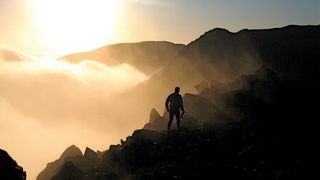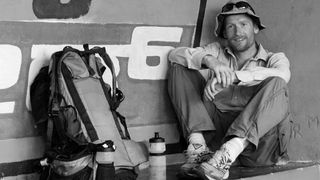The Micro-Adventure Mission: Imagine What You Could Do One Weekend
The micro-adventurer Alastair Humphreys on his achievements and how everyone can fit more adventure into their lives

Alastair Humphreys is a man who knows about adventures both large and small. Early in his career, he went big: witness his four years cycling around the world, his walk across southern India, his six marathons through the Sahara and his Atlantic Ocean row. Recently, though, he’s been going local: he pioneered the art of “micro-adventures” and wrote a book aimed at convincing everyone else to fit more adventure into their lives. In his most recent project, he made his way across Spain busking on the violin – no easy feat, considering he only learned to play it three months before setting off…
What’s the adventure you’re most proud of?
I’m really proud of my first adventure, not just because cycling around the world was the biggest thing I’ve ever done, but because doing something for the first time is so hard. Your friends think you’re an idiot, your family disapprove, you have no skills, no experience, no reason to believe you can achieve the goal. So it is crazy, difficult, scary, but also exciting. I look back at the young version of me and am surprised, grateful and proud that I summoned up the balls to try something new, something so difficult.
The biggest physical challenge you’ve faced?
I spent five years training for an expedition to the South Pole. Sadly I had to withdraw from the expedition so I never made it to the Pole. But this was my first experience of physically training hard for an expedition. I joined the gym for the first time. I learned to do deadlifts and all that good stuff. I even came to enjoy deadlifts! So that was an exciting new physical challenge.
In terms of an actual expedition, pulling a 350kg cart across the desert with my friend Leon was tough. Rowing across the Atlantic Ocean was a grind: two hours row, two hours rest, two hours row, two hours rest, 24 hours a day seven days a week for 45 days. Then the Sahara marathon is a different sort of physical struggle again, running 150 miles through the Sahara in a week: hard, yes, but short and therefore more mentally manageable.
What’s the most dangerous situation you’ve found yourself in – and how did you get out of it?
I try to avoid dangerous situations. I like being alive. I am not a daredevil. The dangers I have encountered are usually my own fault, and usually down to arrogance, hubris or trying to look good on camera. All very stupid reasons to die! An example would be when I crossed Iceland unsupported by foot and by inflatable packraft. I tried to paddle a stretch of river that was much too difficult. Why did I do it? I remember thinking to myself “this will look good on camera”. And off I went. I flipped, I nearly drowned, I scared myself. I learned an important lesson. And, as my punishment, I realised I had forgotten to press record on the camera! What an idiot.
What’s the biggest thing you’ve learned about yourself?
I have learned that I am more stubborn and more persistent than I thought I was. But expeditions force you to be honest with yourself. So I have also learned that I am lazy and not nearly as tough and strong as I used to think I was. That is depressing to realise, but it’s good to realise too. Expeditions are all about learning skills – but learning about yourself too, and mine have given me confidence and momentum that are useful in the real world. Sport, training, expeditions, music, drama: these things that you do all help with the mundane realities of normal life.

What’s the biggest thing you’ve learned about the world while enjoying adventures?
I could talk for ages about this, but I’ll keep it to two things. One: the world is still wild, beautiful and extraordinarily varied, but that is being depleted at a tragic rate. Two: most people in the world are good, kind people. Don’t take the politicians and leaders of a country as examples. Travel around a country slowly, preferably by bicycle, and you will learn that people have so much in common wherever you go. That’s a good thing to learn out on the road.
Get the Coach Newsletter
Sign up for workout ideas, training advice, reviews of the latest gear and more.
See related
- Dave Cornthwaite Wants You To Say Yes To Adventure
- What Ultra-Explorer Ben Saunders Has Learned About The World
- The UK’s Best Adventure Races Of 2021
What’s your next big challenge?
The South Pole is unfinished business for me, but I am self-aware enough to realise that some of my youthful determination has faded – I’m not sure my heart would be in a four-month masochistic slog any more! The challenges I like these days are more creative – trying to learn to write good books and to make good films. Last summer I busked across Spain with a violin, despite not being able to play it very well. It was an exercise in frugality, vulnerability and scaring myself. It was brilliant. I am currently trying to write a book and make a film about that adventure.
What advice have you got for an average guy who wants to inject some adventure into his life?
South Pole expeditions or cycling around the world can put people off the idea of adventure, because they think it is something they can never do. That is why I began promoting my idea of “micro-adventures” – short, local adventures that anyone can do. So I would urge anyone who thinks they don’t have time for an adventure to imagine what they could do in one weekend. How far could you cycle? How far could you run? Could you cycle to the next county, sleep by a river, swim in the ocean, and cycle home again by Sunday evening? That would give you a great story to tell at work and could inspire you to do more. Adventures can be short: the most important thing is just to go.
For more about Alastair Humphreys visit alastairhumphreys.com.
From 2008 to 2018, Joel worked for Men's Fitness, which predated, and then shared a website with, Coach. Though he spent years running the hills of Bath, he’s since ditched his trainers for a succession of Converse high-tops, since they’re better suited to his love of pulling vans, lifting cars, and hefting logs in a succession of strongman competitions.

